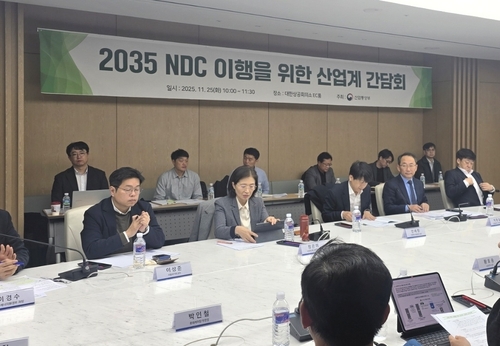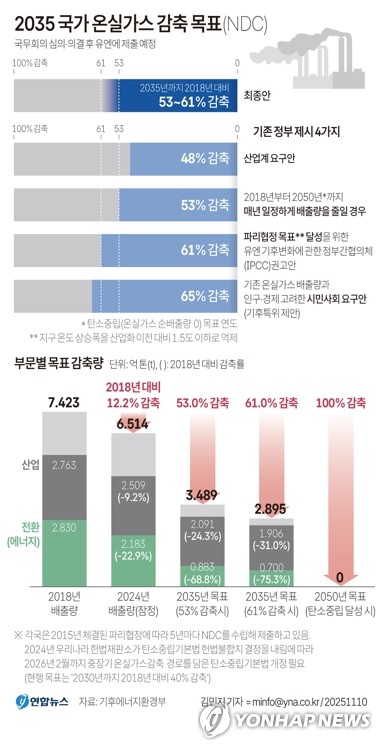(Seoul=Yonhap Infomax) Su Jin Yoo—"There is too much focus on whether South Korea's 2035 Nationally Determined Contribution (NDC) target is 40%, 50%, or 60%. At every meeting, I emphasize that it's not about the numbers, but about a 'policy package.' This is not about regulation, but about fundamentally restructuring the industrial sector," said Ahn Se-chang, Director-General for Climate and Energy Policy at the Ministry of Environment, during the 'Industry Roundtable for 2035 NDC Implementation' held at the Korea Chamber of Commerce and Industry in Jung-gu on the 25th.

The roundtable, jointly organized by the Ministry of Trade, Industry and Energy (MOTIE) and the Ministry of Environment, aimed to strengthen communication with the industrial sector, which has expressed growing concerns following the recent finalization of the 2035 NDC, and to discuss support measures for implementation.
Earlier, the government confirmed at a Cabinet meeting on the 11th that it would cut greenhouse gas emissions by 53–61% from 2018 net levels by 2035. This exceeds the 48% reduction previously considered a 'barely achievable target' by industry by at least 5 percentage points. Specifically, the industrial sector is tasked with a 24.3–31.0% reduction.
Ahn noted, "We initially sought to strengthen the industrial target and ease the power sector's burden. Despite tough tariff negotiations, Minister Kim Jeong-gwan and the MOTIE team worked hard to reach this level of consensus, standing with industry."
He added, "Minister Kim Sung-hwan of the Ministry of Environment often says that MOTIE and the Ministry of Environment are like sibling agencies. We aim to support the direction MOTIE is taking. The Emissions Trading Scheme (ETS) is not intended as a regulatory tool, but as a new opportunity."
Ahn continued, "Last week in Pohang and Ulsan, I saw that each company faces different circumstances. Hyundai Steel Co. and POSCO Holdings Inc. said they are struggling due to a shortage of emissions allowances, but some firms see new business opportunities in the NDC implementation process."
Park Dong-il, Director-General for Industrial Policy at MOTIE, said, "Industry still faces restructuring challenges, and now must also pursue carbon neutrality, which may be frustrating. But if government and industry work together, we can turn the NDC challenge into an opportunity."
He added, "The government is considering various policies, including support for facility investment and eco-friendly technology development. Please share your on-the-ground experiences candidly."

The government acknowledged concerns that the ambitious reduction targets could increase the burden on industry, and announced that the ETS will be operated in line with the lower bound of the NDC (53% overall, 24.3% for industry).
Authorities also pledged to further ease the burden through measures such as emissions offsetting and additional allocation of allowances under current regulations.
MOTIE will launch a large-scale 'Industry GX Plus' R&D initiative worth over 5 trillion won ($3.8 billion) to develop industrial carbon neutrality technologies, and will support incentive-based facility upgrades through auctions and agreements.
The Ministry of Environment will strengthen support for large-scale emission reduction projects by major emitters, and is considering introducing a Carbon Contracts for Difference (CCfD) scheme—currently being adopted in Europe—after 2027.
Additionally, projects with significant greenhouse gas reduction effects will be eligible for preferential interest rates to attract more private capital into carbon-neutral investments.
sjyoo@yna.co.kr
(End)
Copyright © Yonhap Infomax Unauthorized reproduction and redistribution prohibited.

